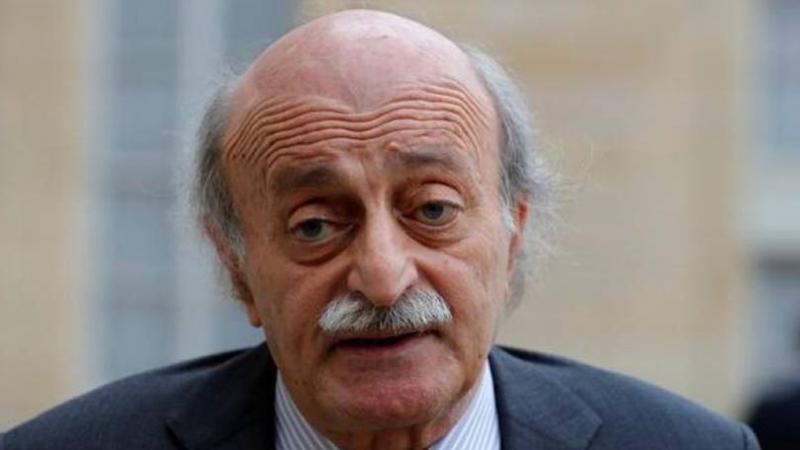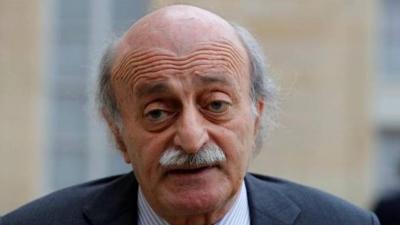Progressive Socialist Party leader Walid Jumblatt expressed that he has not lost hope and will not lose it, emphasizing that "despite all the obstacles, Lebanon must emerge anew, and this can be summarized by abolishing political sectarianism." In an interview with LBC, Jumblatt revealed that he addressed a Hezbollah delegation, stating, "The challenge candidate you brought, President Michel Aoun, has cost the country dearly. Can we agree that there will be no challenge candidate?" They did not respond and confirmed that the presidential file is unrelated to the nuclear file.
He noted that he asked the Hezbollah delegation, "Are we in agreement on border demarcation?" The delegation affirmed this, but cautioned that if the Israelis do not respect the Lebanese demands, there will be a war. Jumblatt requested that Secretary-General of Hezbollah Hassan Nasrallah be informed to continue negotiations, as the situation in some parts of Lebanon is tougher than in Gaza.
Jumblatt stated, "I do not consider Michel Moawad a challenge candidate. He is the son of the martyred Taif agreement leader René Moawad. We want a president who addresses significant contentious issues through dialogue, such as weapons, and to address this file through a defensive strategy." Regarding the French-American-Saudi statement demanding the implementation of international resolutions, Jumblatt reminded the Americans, French, and Saudis of "Resolution 242 related to Palestine, and I remind US Secretary of State Antony Blinken that Israel is altering the features of the West Bank and aggressing against the Golan."
Jumblatt confirmed that they will continue to support Michel Moawad in their struggle, noting that there is no majority in the parliament, questioning whether they would accept Moawad as a consensual president. "Will Moawad accept irrespective of Resolution 1559?" he asked, stressing that he will continue to support Moawad while being open to other names in coordination with him. He mentioned that there are many qualified individuals among them are Salah Hnein and Shibli Mallat.
He emphasized the need to "establish a sovereign fund to preserve the proceeds from gas extraction and sales," expressing concern that in the absence of this fund, some may exploit this file through affiliated companies. Jumblatt also spoke about land borders, stating, "Let us request the Syrian state to demarcate the borders, as Bashar al-Assad previously mentioned that Shebaa Farms and Kfarshouba are not Lebanese. This should be addressed through land demarcation."
Jumblatt criticized the parliament’s scene as disgraceful, considering that the majority of the Lebanese people are on the brink of collapse and noting that there seems to be no candidate for the March 8 coalition. He suggested that "I do not believe Hezbollah, with all its capabilities, can bear further economic collapse, and between it and Suleiman Frangieh lies the Free Patriotic Movement, so let’s see what their conditions are, knowing that there is no substantive discussion with them."
He asserted that "Frangieh is merely a symbol of confrontation and challenge." Jumblatt expressed optimism regarding the border demarcation issue, "because we have obtained what President Nabih Berri has been demanding for ten years, that Qana be included within Lebanese economic lines, separating the maritime line from the land line." He noted that "Lebanon needs Hezbollah defensively, but a singular defense system is required under the leadership of the Lebanese state, which will later be reflected in the defense strategy."
However, Jumblatt questioned, "Who benefits from the gas? The influential and political figures or the Lebanese people? This is why a sovereign fund is necessary." He indicated that "Hezbollah has proven to be adept in diplomacy through the maritime demarcation experience, in this context, we ask it to intervene with the Syrian regime for land demarcation."
Jumblatt disclosed that "the Free Patriotic Movement obstructed the formation of the government, seeking to replace some ministers with provocative figures and imposing its conditions," noting that "we will not participate in the government and do not want to nominate or have others nominate on our behalf, and Prime Minister Najib Mikati has enough wisdom to appoint a successor to Halabi."
Commenting on naming a replacement for the Minister of Displaced Persons, he remarked, "They were defeated in the elections, so how do they return to the government?" Jumblatt condemned "the behaviors of the Iranian authority towards women and students, as this goes against nature, and the Iranian regime cannot persist in this shell." He reminded that "previously we emphasized the necessity of progressive taxation and balanced development, but the Lebanese focused on tourism and services at that time, and I do not defend Riad Salameh, but Michel Aoun's policy aimed to dismiss Salameh to appoint someone else in his place; Aoun's policy was 'malicious,' and Aoun should hold his son-in-law accountable in the electricity file."
Jumblatt also noted that "the judiciary is paralyzed in the port explosion case, and enough of the threats to Tarek Bitar from Syrian tools." In conclusion, Jumblatt emphasized that "the IMF is an obligatory passage, provided that reforms are carried out; without them, we will remain in place, and billions will evaporate as they previously did."




